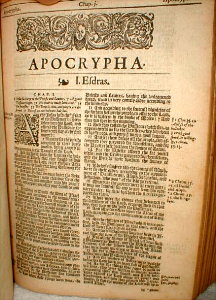 You may have wondered why the Roman Catholic Church includes books in their “canon” that are not in our Protestant Bibles. They include books written in the Intertestamental Period (the 400 years between Malachi and Matthew in our Bibles). These are known as The Apocrypha.
You may have wondered why the Roman Catholic Church includes books in their “canon” that are not in our Protestant Bibles. They include books written in the Intertestamental Period (the 400 years between Malachi and Matthew in our Bibles). These are known as The Apocrypha.
Protestants have not included the books of the Apocrypha in the canon. These are regarded as Deuterocanonical books or books on a secondary (deutero) level to Scripture.
It was not until 1546 at the Council of Trent that the Roman Catholic Church officially declared the Apocrypha to be part of the canon (with the exception of 1 and 2 Esdras and the Prayer of Manasseh). It is significant that the Council of Trent was the response of the Roman Catholic Church to Martin Luther and the Protestant Reformation because the books of the Apocrypha contain support for Catholic doctrines such as prayers for the dead and justification by faith plus works.
The following is an excerpt from an article by Dr. Greg Bahnsen entitled, “The Concept and Importance of Canonicity.”
In terms of the previous discussion, then, what should we make of the Roman Catholic decision in 1546 (the Council of Trent) to accept as canonical the apocryphal books of “Tobit,” “Judith,” “Wisdom,” “Ecclesiasticus,” “Baruch,” “I and II Maccabees”?
Such books do not claim for themselves ultimate divine authority. Consider the boldness of Paul’s writing (“if anyone thinks he is spiritual, let him acknowledge that what I write is the commandment of the Lord” — I Cor. 14:37-38; if anyone “preaches any other gospel that what we preached to you, let him be accursed” – Gal. 1:8). Then contrast the insecure tone of the author of II Maccabees: “if it is poorly done and mediocre, that was the best I could do” (15:38). Moreover, when the author relates that Judas confidently encouraged his troops, that boldness came “from the law and the prophets” (15:9), as though this were already a recognized and authoritative body of literature to him and his readers. (This is also reflected in the prologue to Ecclesiasticus.) I Maccabees 9:27 recognizes the time in the past when “prophets ceased to appear among” the Jews.
Continue reading

 Continued from part 3 27 in the New, over a period of about 1,500 years. So how is it that all these 66 books ever got together in the Bible?
Continued from part 3 27 in the New, over a period of about 1,500 years. So how is it that all these 66 books ever got together in the Bible? There are two ditches on the side of the road of Christian life. One ditch is lawlessness (antinomianism), and on the other side, the ditch of a harsh and hostile legalism that binds spiritual chains around us. Both of these extremes should be avoided always. Yet there is a road to walk if progress in sanctification is to be made, and as the saying goes, to fail to plan is to plan to fail.
There are two ditches on the side of the road of Christian life. One ditch is lawlessness (antinomianism), and on the other side, the ditch of a harsh and hostile legalism that binds spiritual chains around us. Both of these extremes should be avoided always. Yet there is a road to walk if progress in sanctification is to be made, and as the saying goes, to fail to plan is to plan to fail.